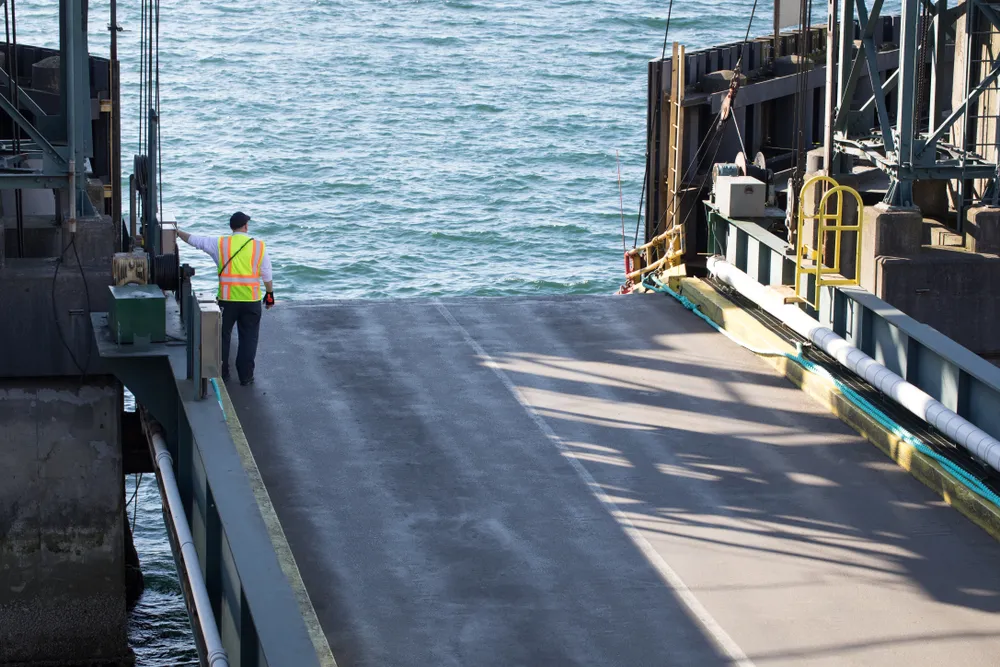 Menu Call Today504.838.8883 Close Back
Menu Call Today504.838.8883 Close Back- Home›
- About US›
- Workers’ Comp›
- Column1›
- Column 2›
- Work Injuries›
- Workers We Represent›
- How does workers’ compensation work?›
- FAQs›
- What to do if I’m hurt at work?›
- How to File a Workers’ Comp Claim›
- When should I hire a Louisiana workers’ compensation lawyer?›
- What will my workers’ comp benefits cover?›
- How long does it take to get workers’ comp benefits?›
- How much will my workers’ comp benefits pay?›
- Can I pick a workers’ comp doctor?›
- Can I collect Social Security disability benefits while receiving workers’ comp benefits?›
- Should I take a lump sum workers’ comp settlement?›
- Can I Change Jobs While on Workers’ Comp in Louisiana?›
- Longshore & Harbor›
- Social Security Disability›
- Areas We Serve›
- Blog›
- Contact›

6 Differences Between the Longshore & Harbor Workers’ Compensation Act and Jones Act
Louisiana’s ports and waterways are important for our economy, but they also pose risks to those who work on or near water. Injured maritime workers in Louisiana can receive financial assistance and protection through two federal laws. These laws are the Longshore & Harbor Workers’ Compensation Act and the Jones Act.
These statutes are designed to offer maritime employees a safety net against the economic fallout of workplace injuries. This provides a level of security that bigger than what is typically available to workers in other sectors.
It is important to understand that these are two different laws. These two are mutually exclusive:you can only receive compensation under one law, not both. Understanding which law applies to your situation is crucial in securing the support needed to recover and rebuild after an injury at work. Let’s explore how to determine which act might cover your claim.
If you believe you have a claim under either of these Acts, or you need assistance determining which is best to pursue, contact us today for a consultation.
Contact a Workers’ Comp Attorney
What is the Longshore & Harbor Workers’ Compensation Act?
The Longshore & Harbor Workers’ Compensation Act (LHWCA) is a federal law designed to provide protection and compensation to employees who work on the navigable waters of the United States or in adjoining areas such as docks, terminals, shipyards, and harbors. It also covers workers employed either directly or indirectly in offshore oil and gas production.
Specifically, it covers those maritime workers who are not classified as seamen and therefore are not covered by the Jones Act. This includes longshoremen, harbor workers, ship-repairers, shipbuilders, blasters, painters, welders, roughnecks, electricians, and plumbers—even cooks and galley hands— and other individuals engaged in maritime employment. Does this sound like you?
The LHWCA offers compensation for workers who suffer injuries or occupational diseases while performing their job duties. That compensation might include:
- Lost wages
- Loss of wage earning capacity
- Money for permanent impairment
- Medical benefits
- Rehabilitation services
The LHWCA gives benefits to employees without needing to prove employer negligence, unlike the Jones Act. It doesn’t matter who caused the injuries, employees can still receive benefits even if the accident and injury was because of employee fault. This act ensures that workers who are vital to the maritime industry have access to essential support in the event of work-related injuries, helping them and their families to navigate the recovery process more smoothly.
What is the Jones Act?
The Jones Act, formally known as the Merchant Marine Act of 1920, is a law that protects American maritime workers hurt at sea. Basically, it lets injured seamen claim compensation from their employers for injuries caused by negligence while working.
The Jones Act and workers’ compensation differ in their requirements. The Jones Act requires the injured person to prove their employer’s negligence caused their injury. It’s important to know that proving negligence under the Jones Act is not difficult. Even a small act of negligence that causes an injury can lead to a claim.
This law reflects a commitment to protecting those who work in the inherently dangerous maritime industry, ensuring they have the means to obtain justice and financial support following an injury. For maritime workers navigating the aftermath of an injury, understanding the Jones Act is the first step towards securing the compensation they deserve.
The Difference in Applicable Workers: LHWCA vs. Jones Act
The eligibility for compensation under the (LHWCA) and the Jones Act hinges on the type of maritime work performed and where it takes place.
Workers Eligible Under the LHWCA
This act casts a wide net, covering a variety of maritime workers who are essential to operations on or near the water but who do not work aboard vessels. This includes:
- Longshoremen: Workers involved in loading and unloading cargo.
- Harbor Workers: Individuals who perform an array of tasks within port facilities.
- Shipbuilders and Ship Repairers: Those tasked with the construction and maintenance of ships.
These workers are safe from harm in open waters and important maritime areas, such as docks, terminals, and shipyards.
The Longshore and Harbor Workers’ Compensation Act also has some very important extensions. One is called the Defense Base Act (“DBA”). This part of the Longshore Act provides recovery to civilian workers under contract (or subcontract) to the United States to perform “public works” outside the continental United States. These are potentially very valuable claims.
Another is the Nonappropriated Fund Instrumentalities Act. This part of the Longshore Act is designed to provide recovery to civilian employees working on U.S. military bases worldwide who are paid with funds that are not appropriated by Congress, like those commonly found working in various capacities on base exchanges.
The War Hazards Compensation Act provides recovery to people whose injuries or death results from a war in which the United States is engaged (declared or not).
Workers Eligible Under the Jones Act
In contrast, the Jones Act narrows its focus to a specific category of maritime employees known as seamen. These individuals must have a substantial connection to a vessel or fleet that is in navigation, which includes:
- Spending a significant portion of their employment on the vessel.
- Contributing to the vessel’s mission or operational function.
This delineation ensures that seamen, who face unique dangers and challenges at sea, have a pathway to seek compensation directly from their employers for negligence-related injuries.
Key Takeaway
While both the LHWCA and Jones Act aim to provide vital protections for maritime workers, their scopes are distinctly different. The LHWCA offers coverage for those working on or near navigable waters in support roles, whereas the Jones Act is dedicated to those who are part of a ship’s crew or captain, directly involved in the vessel’s navigation and operation. Injured maritime workers in Louisiana must determine which act applies to them for compensation and support in their recovery. Contact us to get a free consultation on which act applies to your case.
The Difference in Types of Compensation: LHWCA vs. Jones Act
The Longshore & Harbor Workers’ Compensation Act and the Jones Act provide different compensation options for injured maritime workers. These options greatly impact the assistance you can receive.
LHWCA: Comprehensive Workers’ Compensation Benefits
The LHWCA operates similarly to traditional workers’ compensation systems but specifically caters to the maritime industry. It provides:
- Medical Care: Coverage for all medical treatment related to the work injury.
- Disability Compensation: Compensation for lost wages if a worker is unable to work due to their injury or loss of wage-earning capacity if a worker is unable to return to work in their pre-accident capacity..
- Money for permanent physical impairment
- Vocational Rehabilitation: Support for injured workers who need to train for a new occupation if they cannot return to their previous maritime duties.
Crucially, while the LHWCA ensures these benefits, it does not permit injured workers to sue their employers for negligence. This framework prioritizes straightforward access to benefits over litigation.
Jones Act: The Right to Sue for Negligence
In stark contrast, the Jones Act empowers seamen to take legal action directly against their employers if negligence played a role in their injury. This act provides:
- Maintenance: A daily allowance to cover living expenses during recovery.
- Cure: Coverage for all necessary medical treatment until the seaman achieves maximum medical improvement.
This ability to sue for negligence under the Jones Act holds employers accountable and potentially leads to more substantial compensation for the injured seaman, reflecting the heightened risks of working at sea.
Key Takeaway
The LHWCA and the Jones Act offer different ways for maritime workers to get compensation if they get injured at work. The LHWCA provides benefits without litigation. The Jones Act allows seamen to sue their employers for negligence. They can also receive compensation for medical care and living expenses.
The Difference in Fault and Negligence: LHWCA vs. Jones Act
The concepts of fault and negligence under the Longshore & Harbor Workers’ Compensation Act and the Jones Act fundamentally affect how compensation claims are processed and what is required from you to secure your benefits.
LHWCA: A No-Fault System
Under the LHWCA, the process for receiving compensation:
- Eliminates the Need to Prove Negligence: Workers do not need to demonstrate that their employer was at fault for their injury.
- Allows injured employees recover benefits even if the accident and injury are their fault.
- Provides Benefits Regardless of Fault: Compensation is awarded based on the injury itself, not on the circumstances that led to it.
This approach makes it easier for injured workers to get support without having to prove their employer was at fault.
Jones Act: The Burden of Proving Negligence
The Jones Act places a significant emphasis on fault, specifically requiring:
- Proof of Employer Negligence: Seamen must show that their employer’s negligence contributed in some way to their injury.
- Examples of Negligence: This could include a range of employer failures, from providing unsafe working conditions and inadequate training to neglecting to maintain a safe vessel.
The Jones Act requires proving negligence to compensate seamen for dangerous conditions they face due to employer responsibility.
Key Takeaway
Fault and negligence are treated differently in the LHWCA and the Jones Act, impacting how compensation claims are dealt with. The LHWCA simplifies the process of obtaining benefits without assigning blame. The Jones Act allows seamen to receive compensation by proving their employer’s negligence. This is because working at sea carries inherent risks.
The Difference in Right to Sue: LHWCA vs. Jones Act
The right to initiate lawsuits against employers for negligence or other parties is a crucial aspect that distinguishes the Longshore & Harbor Workers’ Compensation Act from the Jones Act, impacting the legal avenues available to injured maritime workers for seeking additional compensation.
LHWCA: Limited Lawsuit Opportunities
The LHWCA sets specific boundaries on the right to sue:
- Prohibits Suing Employers for Negligence or Fault: Workers covered under the LHWCA can sue for workers’ compensation benefits regardless of fault.
- Allows Suing Third Parties: However, if a third party contributed to the worker’s injury, the LHWCA permits the injured worker to file a lawsuit against that third party. This could include equipment manufacturers, other contractors on a job site, or any entity other than the employer whose actions or negligence played a part in the injury.
Jones Act: Broader Rights to Sue
In comparison, the Jones Act offers seamen expanded rights to legal action:
- Suing Employers for Negligence: Seamen have the explicit right to sue their employers for negligence directly related to their injury or illness.
- Actions for Unseaworthiness: Beyond negligence, the Jones Act also allows seamen to bring actions against the vessel’s owner for unseaworthiness, addressing issues where the condition of the vessel directly contributes to their injury.
Key Takeaway
The stark difference in the right to sue under the LHWCA and the Jones Act highlights the varied legal protections afforded to different categories of maritime workers. The LHWCA limits lawsuits against employers but provides an injured worker with medical and other workers’ compensation benefits. The Jones Act gives seamen more options to seek compensation from their employers or the vessel’s owners for negligence and unseaworthiness.
The Difference in Death Benefits: LHWCA vs. Jones Act
Understanding the provisions for death benefits under the Longshore & Harbor Workers’ Compensation Act and the Jones Act is crucial for the families of maritime workers who tragically lose their lives on the job. These two acts provide different forms of support and compensation to the survivors.
LHWCA: Support for the Worker’s Family
Under the LHWCA, death benefits are structured to provide financial support to the worker’s family:
- Eligible Survivors: These benefits are typically available to the deceased worker’s spouse and dependent children.
- Based on Wages: The death benefit depends on the worker’s wages at the time of their death. This means that the family receives financial assistance that corresponds to the worker’s earnings.
Jones Act: Compensation for Negligence or Unseaworthiness
The Jones Act, on the other hand, allows for a broader range of claims by the survivors:
- Pursuing Damages for Negligence or Unseaworthiness: Survivors can file lawsuits if the seaman’s death resulted from employer negligence or the unseaworthiness of the vessel.
- Types of Damages: This covers payment for the money the seaman would have given. It also covers funeral costs. Additionally, it covers the absence of care, upbringing, and advice the seaman would have given.
Key Takeaway
The approach to death benefits under the LHWCA and the Jones Act reflects the differing natures of these two maritime laws. The LHWCA gives money to the worker’s family, based on their wages. The LHWCA provides financial support to the worker’s family, which is determined by their wages.
On the other hand, the Jones Act enables workers to make larger claims for damages. This is to ensure that employers are held accountable for any negligence or unsafe conditions on their ships.
The Difference in Jurisdiction: LHWCA vs. Jones Act
The jurisdictional aspects of the Longshore & Harbor Workers’ Compensation Act and the Jones Act describe where and how claims under each law can be filed and adjudicated.
LHWCA: Federal Workers’ Compensation Program
The LHWCA operates under a specific framework:
- Administered by the U.S. Department of Labor: This program is for federal workers and is managed by the Department of Labor. It protects maritime workers who are not seamen.
- Federal Oversight: Claims and disputes under the LHWCA are handled through the federal administrative process, ensuring uniformity and adherence to federal standards.
Jones Act: Federal and Sometimes State Jurisdiction
The Jones Act provides a different pathway for legal recourse:
- Primarily Federal Maritime Law: Federal maritime law resolves most Jones Act claims, governing the rights and duties of maritime workers.
- Potential for State Court Proceedings: State courts can pursue Jones Act claims in certain circumstances. This flexibility allows for strategic legal planning and potentially broader avenues for seeking justice and compensation.
Key Takeaway
The LHWCA is a federal workers’ compensation system. The Jones Act allows claims under federal maritime law or in state courts. These differences support the customized methods used by these laws to protect seafarers. These methods consider the specific dangers and conditions that seafarers encounter in their jobs.
In conclusion, navigating the intricate legal landscape of maritime workers’ compensation can be daunting, especially considering the unique circumstances of each individual case. With the Longshore & Harbor Workers’ Compensation Act (LHWCA) and the Jones Act presenting distinct avenues for support, understanding which law applies to your situation is crucial.
At Worker’s Compensation, LLC, we recognize the challenges you may face and are here to offer guidance and support. Let us help you decipher the complexities of these laws and determine which act is right for you. Reach out to us today for a consultation, and let’s work together to ensure you receive the compensation and assistance you deserve.
I Want My Free Consultation

Serving Workers
CALL US »Metairie OFFICE
Hours:
Monday - Friday
8AM - 5PM






